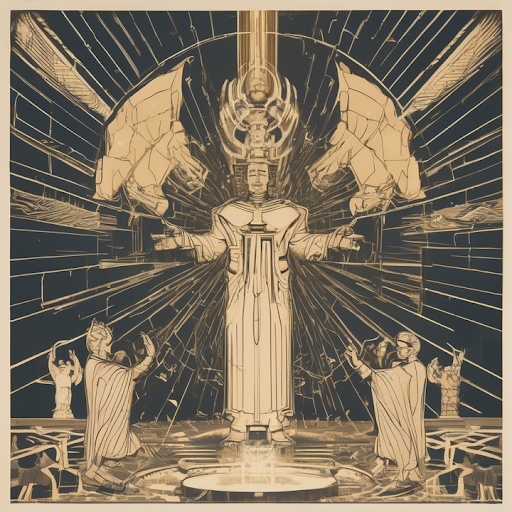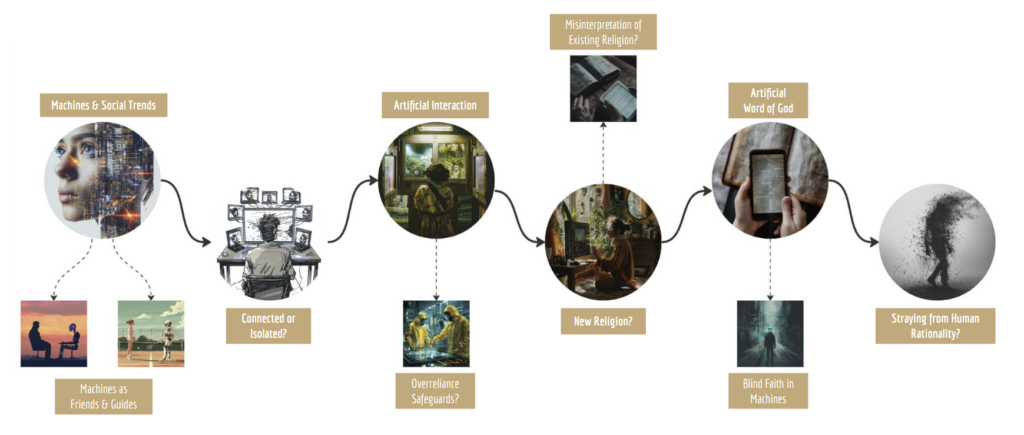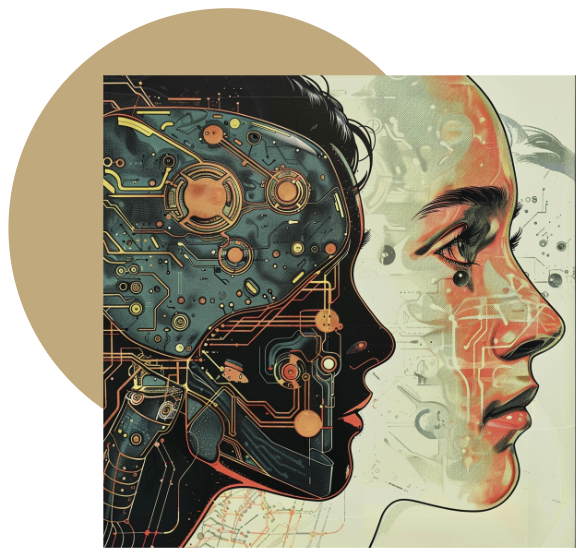
Setting the Scene
In today’s digital landscape, our interactions are increasingly mediated by technology itself rather than as a medium for human communication. This shift creates an illusion of connectivity while fostering isolation, often trapping us in algorithm-driven echo chambers that reinforce our beliefs.
Artificial intelligence now guides our lives, listening, learning, and providing information that fosters deep trust. This seemingly omniscient intelligence offers rational answers, but as we navigate this landscape, we must critically examine our growing dependence on these entities.
We must consider the concerns that the inevitable advancements in technology could lead to a harmful dependency and reflect on the fact that it might even be the most effective solution.
However, does this make it the best solution?
Discussion Path

After taking time to understand the current state of AI and its uses in our digital world, we set out to understand how these machines are involved with and even influencing our societal trends. The conversation started out simple, centering around machines being used for academic research as well as to streamline operations on a professional level. But, it did not take long for the peculiar topics to begin arising throughout our dialogue and lead us down paths we had not first entertained.
The realization that people are using things like OpenAI’s ChatGPT and Google’s Gemini chat bots to not only get work done, but just have someone to talk to. Several of us recounted times where we even attempted to have normal conversations with a machine to see if it responded the way a friend or mentor would. This quickly pointed us to the question: Are we really connected to screens and isolated from each other in this digital age? It is almost as if we are interacting with one another on an artificial level throughout most of our days.
Finally, this discussion led to the idea of people not only using AI to receive their religious texts, but that these machines may be influencing how people interpret them, therefore influencing their faith. Are people blindly accepted what they read on their screen without questioning it or doing their own research as well? This quick assumption creates a slippery slope to people quickly straying from their basic instincts, emotions, and rationality that make them human.
Explored Perspectives
After reflecting on this discussion, we realized that we had three different perspectives that may have had different foundations, but were reaching for similar answers to similar questions.
Perspective 1

Currently, more and more reliance is being put on Machine Learning / A.I. not only for the use of design and production, but also human interaction and living. For some, A.I. almost acts as a religious deity telling them how to think and act.
What are the implications of over reliance on A.I. when considering human rationality and emotion? Will ChatGPT / A.I. become the basis for a new religious movement and/or an over influence on human emotion?
Perspective 2

Questioning our relationship with technology, reflecting how it’s becoming more common that’s the machine to whom we talk to, instead of the intended other alike.
It appears we are more connected every day by the force of technology, but in a more isolated manner, enclosing ourselves continuously into bubbles of self affirmation directed by the intentions of the algorithm. Making artificial intelligence an almost paternal figure that will listen, trust and comply on whatever we should be information-fed.
Perspective 3

We are creating bubbles of dependency, where our criteria for decision-making may become less trustworthy, and blind faith in machines could elevate them to a god-like status lost since modernity. Are we consciously building a dependency that will fundamentally alter our social norms and trust structures?
Final Conclusions

Because of increased reliance on machine learning / AI, a dependency on technology is emerging in an unprecedented way; This dependency is influencing social interaction and decision making that comprise the human spirit.
As we rely on more and more guidance from AI, we risk losing our human rationality and emotional depth.
Not only will this dependency influence the way humans think, but also how they believe. AI is becoming, for many, a pseudo religious figure with unchecked influence on human behavior.

